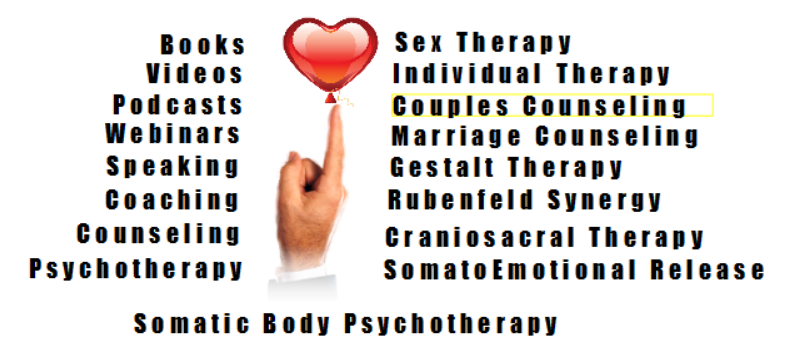Why do people seek counseling and psychotherapy?

People come into therapy for many reasons. Some need to respond to unexpected changes in their lives, while others seek self-exploration and personal growth. When coping skills are overwhelmed by guilt, doubt, anxiety, or despair, therapy can help. Therapy can provide support, problem-solving skills, and enhanced coping for issues such as depression, anxiety, lack of confidence, relationship troubles or marital conflicts, sexual difficulties, unresolved childhood issues, bereavement, spiritual conflicts, stress management, body image issues, and creative blocks. People seeking psychotherapy are willing to take responsibility for their actions, work towards self-change and create greater awareness in their lives.
Why would someone specifically seek a sex therapist?
![]()
Love and relationships in our modern world are often complex, difficult and somewhat confusing. We may love our partner deeply, feeling emotionally close, secure and happy, yet we may have a secret longing for something more sensual, more exciting, or just something different. In some cases, we actually seek out these new and exciting behaviors, risking everything we truly want to have in our life (love, affection, family, and intimacy). We may have a powerful sexual connection to a person with whom we seem to share very little emotional closeness or we may feel compulsively attracted to someone who criticizes, demeans, rejects or abandons us. We cannot separate our sexuality from the rest of our physical, emotional, psychological and even spiritual life.
Our unique sexual response patterns, our individual desires and cravings, likes and dislikes, choices and behaviors describe and define us perhaps more significantly than our educational, career and financial achievements. A qualified and experienced sex therapist can help us to sort through our emotional confusion and sexual pressures to resolve conflicts and create the type of satisfying relationship we truly want.
What can I expect in a counseling or psychotherapy session?
![]()
During sessions you are encouraged to talk as openly as possible about the primary concerns and issues in your life. A session usually lasts for either 1 1/2 hours or 1 hour, but some people request longer intensive sessions (especially if they are coming from a distant city). Most individuals come for weekly sessions. Couples often come for a joint session and separate individual sessions each week. When clients are in crisis or extreme distress , they may request several sessions in the same week. My schedule is rarely tightly packed, so I am usually able to accomodate last minute, crucial sessions when needed.
During the time between sessions it is beneficial to think about and process what was discussed. At times, you may be asked to do some simple homework assignment outside of the session, such as watching a specific movie, reading a certain article, writing in a journal, or practicing some mind-body healing technique. Whether you participate actively or just come for sessions to vent and discuss your problems, therapy often creates many desired changes in your life. The more you participate actively in your own healing process, the more likely you are to perceive results more rapidly.
What benefits can I expect from working with a counselor or psychotherapist?
![]()
The therapeutic process offers many benefits. Just knowing that someone will listen to you, without judgement and criticism, can offer you the opportunity to talk fearlessly about your private and personal thoughts and feelings and life experiences. Feeling heard and understood, perhaps for the first time in your life, you can begin to accept yourself exactly as you are in this moment. That is the first step in the healing process.
A qualified and experienced therapist can provide you with insight, understanding and a broader perspective about life, love and your particular difficulties. During therapy, you may have the sense that you are talking to a loving, caring, wise and educated friend, a friend who has only your best interests at heart. But a therapist is more than a friend. A therapist attempts to help you in an objective and detached manner, not getting emotionally involved in your issues, so that he or she can provide clarity when your eyes and mind become cloudy.
Psychotherapy can help you to:
- Understand yourself, your needs, wants and personal values
- Develop insight and skills for improving your relationships
- Find new ways to cope with your stress and anxiety
- Manage your anger, depression, anxiety, and other emotions
- Communicate with more clarity and confidence
- Get “unstuck” and recreate your life
- Develop personal competence and improved self-esteem
Why would I seek a body therapy, somatic awareness, or body psychotherapy session?

Our body holds the answer to many of our unresolved psychological problems. When we are thinking certain thoughts and feeling specific emotions, all the organs in our body respond accordingly. If we are feeling peaceful, loving thoughts and emotions, our blood vessels expand, our breathing is calm and full, and our neuromuscular system functions efficiently. However, when we are upset, we restrict our breathing, our blood vessels constrict, and our muscles, tendons, ligaments, membranes and connective tissues tighten between, around and among our organs. Ancient Asian medical wisdom teaches us that the particular emotions we are feeling actually respond to the specific locations of bodily tension or the body tensions help to create those emotions.

Body therapy methods (e.g., Craniosacral Therapy, Polarity Therapy, Massage Therapy) can assist our body to let go of habitual patterns that affect our emotions and our thoughts. Body psychotherapy methods (e.g., Rubenfeld Syngery, Somatoemotional Release) help us to intellectually understand the specific meanings of our own unique patterns as we let go of the patterns, allow our body to experience a new state of being and assist our brain to soften old synapatic responses in favor of newly created pathways.
What if I don’t know what my goals are for counseling or psychotherapy?

The very first step is to know what you want in your life: your relationships, your career, your family, your health your physical well being, and your spiritual connections. The therapeutic process is a continual clarification of who you are, what you want, what direction you want to go and what steps you can take to fulfill your dreams.
Do you accept insurance? How does insurance work?

The first thing you should do is check with your insurance carrier. Check your coverage carefully and find the answers to the following questions:
- Do I have mental health benefits?
- What is my deductible and has it been met for this calendar year?
- How many sessions per calendar year does my plan cover?
- Will I be reimbursed for seeing an out-of-network provider?
- What is my out-of-pocket expense for an out-of-net provider?
- Is there a limit on how much I can afford to pay per session?
- Is my primary care physician approval required?
Is counseling, psychotherapy, body psychotherapy and especially sex therapy confidential?

In general, the law protects the confidentiality of all communications between a client and a psychotherapist. Information is not disclosed without written permission. However, there are number of exceptions to this rule. Exceptions include:
- Suspected child abuse or dependant adult or elder abuse. The therapist is required by law to report this to the appropriate authorities immediately.
- If a client is threatening serious bodily harm to another person/s. The therapist must notify the police and inform the intended victim.
- If a client intends to harm himself or herself. The therapist will make every effort to enlist their cooperation in insuring their safety. If they do not cooperate, further measures may be taken without their permission in order to ensure their safety.
THERAPY SERVICES FOR INDIVIDUALS, COUPLES, AND GROUPS

Sex Therapy for Sexual Dysfunctions, Intimacy Issues, and Compulsive Sexual Behaviors
Marriage Counseling and Couples Counseling for Pre-Marital Concerns, Recently Married, Separation and Divorce Problems, Singles Seeking Relationships, Couples in Long-Term Relationships or Cohabiting, Remarriages
Psychotherapy for Anxiety, Anger, PTSD, Depression, Grief, Abusive Relationships, Health Concerns, Aging, and Creating and Sustaining Love Issues
Counseling for Emotional Distress, Loneliness, Dating Fears, Creativity Concerns, Heterosexual, Homosexual, Bisexual, and Gender Issues
Coaching for Virtual Clients, Goal Setting, Life Planning, Health and Wellness, Intimacy Enhancement, Emotional Well Being
Somatic Body Psychotherapy for access to deep emotions, clarity about options and choices, mind-body-spirit connection, greater capacity to love, inner confidence, emotional well being
LOCATIONS SERVED IN SOUTH FLORIDA
Boca Raton
Coral Springs
Deerfield Beach
Delray Beach
Highland Beach
Fort Lauderdale
Pompano Beach
West Palm Beach
Miami
954-649-5228
Dr. Erica Goodstone
Latest posts by Dr. Erica Goodstone (see all)
- How Are You Feeling? - August 12, 2023
-
Love Vs Hate How Much Love Can We Share To Eliminate Hate? - July 23, 2022 - Can We Really Heal Through Love? - August 9, 2020
